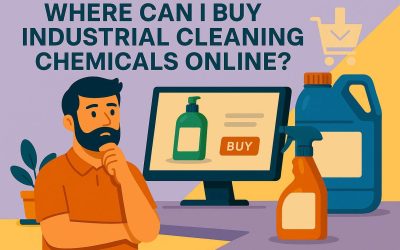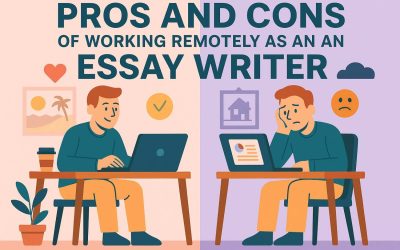Cleanliness is essential in any organization. However, some facilities require more than spotless surfaces for workplace safety, compliance and liability mitigation. Industrial cleaning chemicals are necessary for sanitation and disinfection. These specialized...

Why SMEs think switching business energy is hard
SMEs are now using more electricity than at any point in history, consuming between 15,000 and 65,000 kWh each year in the UK.
To put those figures into perspective, 65,000 kWh is up to 16 times more than the average UK household, which consumes 4,000 kWh on average.
Our relationship with energy is changing too. Smart and half-hourly meters are rapidly replacing older metering systems, and some businesses are adopting smart thermostats and smart switches to control their energy in new ways.
Yet, around half of SMEs won’t switch their energy supplier this year – despite a big opportunity to save hundreds of pounds on their annual electricity bill, and despite a report from Citizens Advice warning over a million UK businesses are at risk of being ripped off.
This is intriguing — the way businesses are taking control of their energy at the point of use, but not at the source with their supplier. So, what’s going on?
National business energy survey
To find out why SMEs are so reluctant to switch their energy supplier, the business energy switching service EnergyBillKill conducted a survey involving 500 UK SMEs. They asked them why they won’t switch and what barriers are in their way.
Here are the key findings:
- 51% of SMEs consider switching too challenging
- 51% of SMEs think switching is harder than tooth extraction or firing people
- 22% of SMEs think switching energy is too costly
- 21% of SMEs don’t know where to start with a switch
- 35% of SMEs think energy suppliers will overcharge them
- 25% of SMEs are reluctant to switch supplier because they don’t trust brokers
Dwindling trust in the energy market
This survey highlights that the levels of trust businesses have in suppliers is dwindling. High energy prices and numerous billing and mis-selling scandals over the years have tainted the energy sector beyond repair.
In response to the survey:
- 35% of SMEs said they don’t trust energy companies;
- 26% of SMEs said they don’t trust brokers
- 25% said “everyone is a crook”
All in all, this is showing just how tainted the energy market really is.
Switching is harder than tooth extraction
Another thing the survey highlighted is just how difficult many SMEs find switching energy to be.
21% of SMEs said they wouldn’t know where to start, and incredibly, 51% said switching is harder than tooth extraction or firing people.
This is a startling statistic, so we’ll say it again: 51% of SMEs believe switching their energy supplier is harder than tooth extraction or firing people.
Lifting barriers
If we’re being honest, we can probably all agree that all businesses want is a fair and competitive energy market that makes switching simple.
Despite competition laws, energy suppliers are reluctant to advertise the opportunity to switch to other suppliers because they lose the value of a contract.
This is why brokers, also known as Third Party Intermediaries (TPIs), have an important role to play in giving energy-related advice and helping SMEs switch. They can help you switch to a supplier offering cheaper prices on business energy.
26% of SMEs said they don’t trust brokers; but, that’s far less than the 35% who said they don’t trust energy companies. For SMEs considering switching, starting with a reputable and proven intermediary is probably the way to go.
More must-read stories from Enterprise League:
- Reduce your costs while maintaining your efficiency by implementing these 23 tips.
- Get inspired by these business role models that entrepreneurs love.
- Learn about the main supply chain challenges and how to resolve them today.
- Every trick to writing a killer B2B proposal.
- Debunking the most common myths of entrepreneurship.
Related Articles
Where Can I Buy Industrial Cleaning Chemicals Online
Pros and Cons of Working Remotely as an Essay Writer
The pandemic totally flipped everything upside down, right? Suddenly, like, millions of people had to figure out this whole work-from-home thing. But essay writers? They've kinda been doing this forever. Coffee shops, couches, random hotel rooms - they were the...
Who Are the Top-Rated Garage Door Professionals in Charleston – 8 Options for Homeowners
Garage doors are essential for businesses with vehicles or inventory, helping prevent theft and improve insulation. Plus, their appearance can contribute to the business's image and reputation. That said, it's important to find the right professionals who can supply...
Can You Combine Snow Removal and Janitorial Services Under One Provider? Here’s What You Should Know
When scheduling winter ice removal, coordinating custodial teams and ensuring consistent service quality, managing several vendors often leads to inefficiency, miscommunication and added costs. Business owners often wonder if they can combine snow removal and...
What Companies Offer Horse Transportation Services? 5 Options to Review
Transporting a horse involves more than simply loading it into a trailer. When the stakes include international regulations, health certifications, quarantine rules, shipment timing and an animal's well-being, the process becomes a complex logistical project. If you...


















